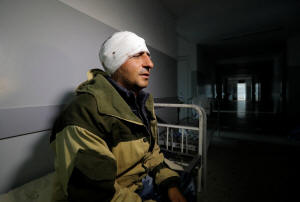Nagorno-Karabakh ceasefire marred by aid delay, accusations of new
attacks
 Send a link to a friend
Send a link to a friend
 [October 15, 2020]
By Nailia Bagirova and Nvard Hovhannisyan [October 15, 2020]
By Nailia Bagirova and Nvard Hovhannisyan
BAKU/YEREVAN (Reuters) - Armenia accused
Turkey on Thursday of blocking flights carrying emergency aid from using
its airspace, and new fighting over the Nagorno-Karabakh enclave
threatened to pitch the region into a humanitarian crisis.
Azerbaijan and Armenia accused each other of violating a ceasefire
brokered less than a week ago to enable the sides to swap detainees and
the bodies of those killed in the clashes, which erupted on Sept.27.
The flare-up is the deadliest since the 1990s, when 30,000 people were
killed in a war over Nagorno-Karabakh , a territory that is
internationally recognised as part of Azerbaijan but governed by ethnic
Armenians.
Azeri President Ilham Aliyev said on Twitter Armenia should "halt
attempts to capture liberated territories back," and warned of "new
victims and new bloodshed".

Azerbaijan's defence ministry said its army had retained an "operational
advantage" along the line of contact with Nagorno-Karabakh, but that the
situation in the Aghdere-Aghdam and Fizuli-Hadrut-Jabrail directions
remained tense.
The Azeri prosecutor's office said two civilians were wounded by
shelling in Aghdam.
Armenian defence ministry spokeswoman Shushan Stepanyan accused the
Azeri armed forces of artillery fire from the north and south-east, but
said Nagorno-Karabakh's forces were taking "appropriate counter-measures
against the attacks".
The Armenian prosecutor-general's office said Azeri drones had killed
two soldiers in the Armenian region of Vardenis on Wednesday, raising
the military death toll since Sept. 27 to five. The personnel were not
involved in military action, it said.
Reuters could not independently verify the reports.
HUMANITARIAN AID
International organisations, including the International Committee of
the Red Cross, have warned that the conflict, coming on top of the
COVID-19 pandemic, could leave tens of thousands of people in need of
aid over coming months.
[to top of second column]
|

A wounded ethnic Armenian soldier sits on a bed in a hospital,
which, according to the Ministry of Foreign Affairs of the
Nagorno-Karabakh region, was damaged during the shelling by Azeri
armed forces, in the fighting over the breakaway region of
Nagorno-Karabakh, in Martakert October 15, 2020. REUTERS/Stringer

Zareh Sinanyan, Armenian High Commissioner for Diaspora Affairs,
said the delivery of 100 tonnes of aid from the United States was
being delayed as Turkey had prohibited Armenia-bound humanitarian
aid flights over its airspace.
Armenia's civil aviation committee was told on Wednesday the Qatar
Airways flight from Los Angeles was cancelled but gave no reasons,
its head, Tatevik Revazyan, told Reuters.
"We have grounds to claim that Turkey closed the air route
deliberately," Revazyan said, adding that Armenia was seeking an
alternative route over Russia or Georgia.
Turkey's foreign ministry, which handles airspace issues, was not
immediately available to comment.
Aside from humanitarian concerns, fears are growing of Russia and
Turkey being sucked in. Turkey's military exports to its Azeri ally
have risen six-fold this year, data shows, and Armenia has a defence
pact with Russia.
In a phone call on Wednesday with Turkish President Tayyip Erdogan,
Russian leader Vladimir Putin expressed concerns about the
participation of Middle East fighters in the Nagorno-Karabakh
conflict, though Turkey and Azerbaijan deny the presence of such
fighters.
The fighting is not far from Azeri pipelines which carry natural gas
and oil to international markets. Aliyev accused Armenia on
Wednesday of trying to attack the pipelines, a charge that Armenia
denied.

Nagorno-Karabakh authorities say 604 defence personnel have been
killed since Sept. 27. Azerbaijan said on Wednesday 43 civilians had
been killed but has not disclosed military casualties.
(Additional reporting by Margarita Antidze in Tbilisi and Jonathan
Spicer in Ankara; Writing by Sujata Rao; Editing by Timothy
Heritage)
[© 2020 Thomson Reuters. All rights
reserved.] Copyright 2020 Reuters. All rights reserved. This material may not be published,
broadcast, rewritten or redistributed.
Thompson Reuters is solely responsible for this content. |